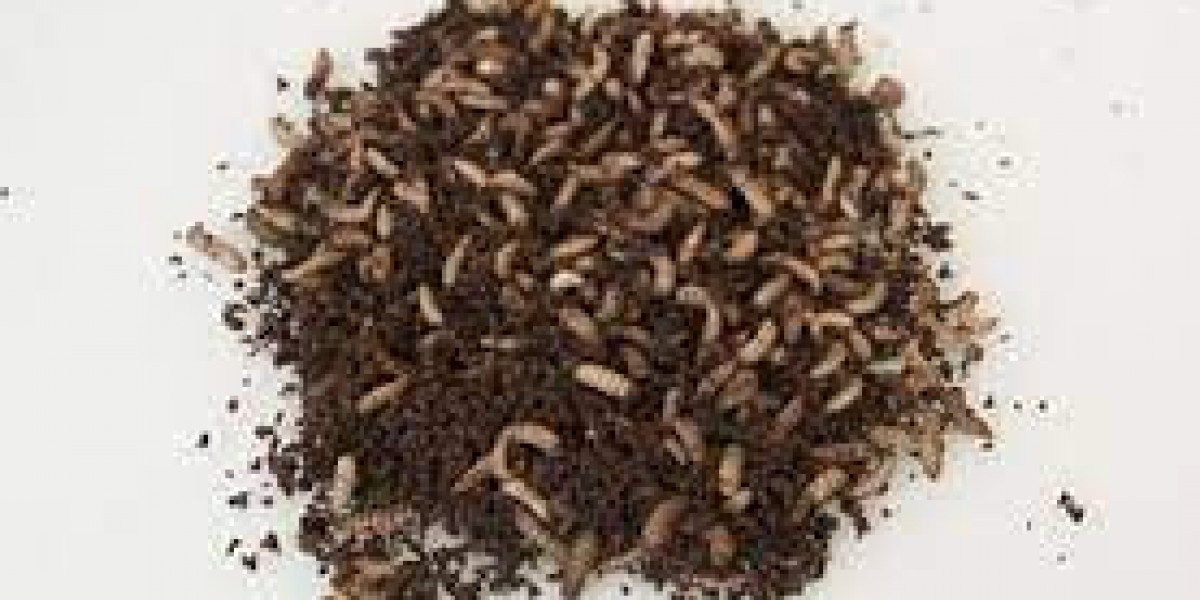The Insect-based Fertilizer Market is witnessing a surge in opportunities as food waste becomes a valuable input for agricultural production. With food waste accounting for a significant portion of global waste, innovative solutions to repurpose this organic material are being developed, creating new pathways for sustainability in farming. Insect-based fertilizers are at the forefront of this movement, turning discarded food into a valuable resource for improving soil health and boosting crop yields.
The Growing Problem of Food Waste
Food waste is a pressing global issue, with millions of tons of food discarded every year while millions of people around the world suffer from hunger. According to the Food and Agriculture Organization (FAO), approximately one-third of all food produced globally is wasted. This not only represents a huge economic loss but also places a strain on environmental resources.
The environmental impact of food waste is significant as well. As food decomposes in landfills, it generates methane—a potent greenhouse gas that contributes to climate change. Tackling food waste through innovative solutions such as insect farming can significantly reduce its environmental footprint while providing a sustainable source of fertilizers for agriculture.
The Role of Insects in Repurposing Food Waste
Insect farming has emerged as an effective solution for repurposing food waste. Certain species of insects, such as black soldier flies, are capable of consuming organic waste, including food scraps, agricultural by-products, and other organic materials. These insects then convert the waste into high-quality protein and nutrients, which can be processed into insect-based fertilizers.
Insect farming is a highly sustainable practice for several reasons:
Efficient Waste Processing:
Insects can consume a variety of organic waste, converting it into valuable nutrients for plants. This process reduces the amount of food waste sent to landfills, mitigating environmental harm and creating a resource from what would otherwise be discarded.Low Environmental Impact:
Insect farming requires far fewer resources than traditional livestock farming. Insects need less water, land, and feed, making them an energy-efficient way to produce fertilizers. This low-resource input helps reduce the carbon footprint of insect-based fertilizers, making them a more sustainable alternative to synthetic fertilizers.Circular Economy Benefits:
Insect farming fits perfectly into the circular economy model, where waste is repurposed into valuable products. By converting food waste into fertilizers, insect farming helps close the loop on agricultural waste and supports sustainable farming practices.
How Insect-based Fertilizers Benefit Agriculture
Insect-based fertilizers offer several benefits to farmers and the agricultural sector:
Nutrient-Rich Fertilizers:
Insect-based fertilizers are rich in essential nutrients such as nitrogen, phosphorus, and potassium, which are critical for plant growth. These natural fertilizers provide a balanced nutrient profile that supports healthy crops, enhancing yields and reducing the need for chemical fertilizers.Improved Soil Health:
The application of insect-based fertilizers can improve soil structure by promoting the growth of beneficial microbes and enhancing organic matter content. Healthier soil leads to better water retention, improved nutrient cycling, and greater resilience against pests and diseases.Sustainability and Environmental Impact:
As the demand for sustainable farming practices rises, insect-based fertilizers offer an eco-friendly alternative to traditional fertilizers. By reducing the reliance on chemical inputs, insect-based fertilizers help decrease pollution, mitigate climate change, and promote long-term soil health.
Key Drivers of Insect-based Fertilizer Adoption
Several factors are driving the adoption of insect-based fertilizers in agriculture:
Food Waste Management and Recycling:
With food waste management becoming a priority for governments and organizations, turning food waste into valuable agricultural inputs presents an attractive solution. Insect farming offers a scalable and efficient way to recycle food waste, turning it into nutrient-dense fertilizers that support sustainable agriculture.Government Regulations and Sustainability Initiatives:
Increasing regulations around sustainability and environmental protection are encouraging farmers to adopt eco-friendly alternatives. Incentives and subsidies for sustainable farming practices, including the use of insect-based fertilizers, are making these products more accessible to farmers worldwide.Consumer Demand for Sustainable Products:
As consumers increasingly demand environmentally conscious products, farmers are under pressure to adopt sustainable farming methods. Insect-based fertilizers align with the growing demand for organic and eco-friendly food, providing a market-driven incentive for their use.Technological Advances in Insect Farming:
Advances in insect farming technology have made it easier and more cost-effective to produce insect-based fertilizers. Innovations in automation, waste management, and breeding techniques are helping to streamline production, making insect fertilizers more affordable for farmers.
Potential for Insect-based Fertilizers in the Global Market
The global Insect-based Fertilizer Market is poised for significant growth as the agricultural industry increasingly recognizes the value of insect-based solutions. Several regions, including North America, Europe, and parts of Asia, are already seeing growing interest in insect farming as a way to address food waste while providing sustainable fertilizers.
The market opportunities for insect-based fertilizers are expanding as more farmers, particularly those involved in organic and sustainable farming, seek alternatives to chemical fertilizers. The ability to use locally sourced food waste to produce fertilizers also offers an opportunity for small-scale farmers to reduce costs and improve productivity.
Challenges to Overcome
Despite the promising potential of insect-based fertilizers, several challenges remain in the industry’s growth:
Public Perception and Acceptance:
Insect-based fertilizers are still a relatively new product, and some farmers and consumers may be hesitant to embrace them. Overcoming misconceptions and increasing awareness about the benefits of insect fertilizers will be crucial for market expansion.Regulatory Frameworks:
The regulatory environment for insect-based fertilizers is still evolving in many regions. Clearer guidelines and quality standards will be necessary to ensure the safe and effective use of insect-based fertilizers in agriculture.Scalability of Production:
While insect farming is highly efficient, scaling production to meet the growing demand for insect-based fertilizers may require significant investment in infrastructure and technology. However, as the market matures, economies of scale will likely drive down production costs.
Conclusion: A Sustainable Future for Agriculture
The Insect-based Fertilizer Market is well-positioned to play a key role in the future of sustainable agriculture. As food waste becomes a valuable agricultural input, insect-based fertilizers provide an effective and environmentally friendly solution to address the challenges of chemical fertilizer use and soil degradation. With technological advancements, regulatory support, and growing consumer demand for sustainable products, insect-based fertilizers are set to become an integral part of the global agricultural landscape, offering a win-win solution for both the environment and farmers.








